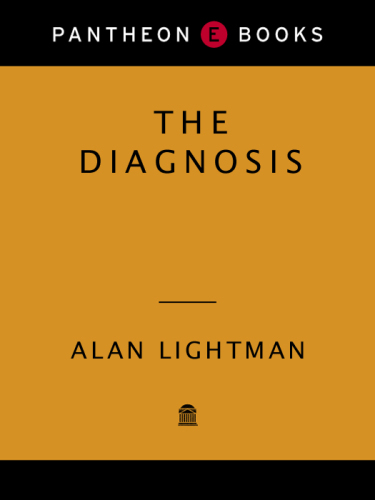
The Diagnosis
A Novel
کتاب های مرتبط
- اطلاعات
- نقد و بررسی
- دیدگاه کاربران
نقد و بررسی

September 4, 2000
The author of Einstein's Dreams has made a darkly affecting book out of what seems at first to be unpromising material. Bill Chalmers is an executive at an "information company" in Boston who on his way to work one day forgets completely who he is, what he does or where he is supposed to be going. After a number of nightmarish experiences, in which he rapidly becomes a homeless bum, he awakens in a hospital, more or less his old selfDexcept that his body is beginning to turn numb. So far, this approximates a conventional "breakdown under the pressures of civilization" story (and Lightman is particularly good at evoking the impersonal horrors of contemporary urban life). But the progress of Chalmers's ordeal is much stranger, richer and more weirdly comic than that. He sees a doctor who can offer only infinite tests, a psychiatrist who seems equally at a loss. Wife Melissa, conducting a cyber affair with a professor (e-mails figure extensively in the book, the kind of typos we all commit rendered with malicious glee), begins to fall apart, taking to drink as Bill gets worse. Eventually confined to a wheelchair, Bill senses that his son, Alex, a computer geek, is growing apart from him. When he's fired by his employers, Bill sues them for unfair dismissal of a sick man. All this is conveyed in scenes that show a subtly calibrated mastery of comic timing, emphasizing contemporary heedlessness and a helpless anger. The ending, as Chalmers draws increasingly inward, seeing himself only as a brain stem in an utterly dysfunctional body, carries haunting echoes of a similar passage at the conclusion of James Joyce's The Dead. Lightman's masterly study of early 21st-century angst is marred only slightly by a series of episodes from the trial and hemlock poisoning of Socrates, first called up as an e-lesson by Alex, then read by him and Melissa to Bill as he sinks further into desuetude. Vivid as these scenes are, their link with the present is extremely tenuous. Is Lightman saying that things were just as bad 2,000 years before cell phones and traffic jams, or is he imparting some hidden Socratic instruction?

September 15, 2000
Despite its overuse, the term Kafkaesque is the best one-word summation of this book, in which physicist and novelist Lightman (Einstein's Dreams) traces the gradual deterioration of his protagonist's body and the concomitant disintegration of his work, family, and social life. One morning while riding the subway to work, Bill Chalmers forgets where he is going or who he is. All he can remember is his company's motto: "The maximum information in the minimum time." This tale of Chalmers's nightmarish search for a diagnosis for his condition is a true literary heir of Kafka, brilliantly reflecting for a 21st-century readership the provocative ideas expressed at another century's turn. Lightman's evocation of the growth of Chalmers's interior life, as set against the disappearance of his normal outward life, is both luminous and dark. The author also introduces a fictional narrative of the death of Socrates, told with compact tension. Working out how the stories relate to each other poses a worthwhile puzzle for the reader. Recommended for literary collections.--David Dodd, Marin Cty. Free Lib., San Rafael, CA
Copyright 2000 Library Journal, LLC Used with permission.

Starred review from August 1, 2000
Lightman, author of "Einstein's Dreams" (1993), perfectly captures the frenzy of our electronic era in this breakneck tale of one man's short-circuiting under the relentless pace and pressure of life in the age of information overload. Always on the phone, compulsively checking his watch, and frantically responding to e-mails, Bill Chalmers runs himself ragged until, suddenly, he snaps. Crammed into a train stuffed with commuters communing with laptops, cell phones, and portable CD players, Bill cannot remember his name or his destination, and in no time he's descended into a circle of hell. As Lightman tracks the progression of Bill's clearly metaphysical malady, and his mythic and darkly comic quest for a diagnosis, he interleaves installments in the story of Socrates and his persecutor, Anytus, which Bill's computer-addicted teenage son downloads from the Internet, thus creating a curious juxtaposition between his disconnected and stoic hero and the dignified but doomed philosopher. A work of vivid sensuousness, sparkling intelligence, and poignant beauty, Lightman's gripping tale contrasts the needs of the body and spirit with the acquisitiveness of the mind and ponders the potential lethality of ideologies, be they cultural or technological. ((Reviewed August 2000))(Reprinted with permission of Booklist, copyright 2000, American Library Association.)

























دیدگاه کاربران